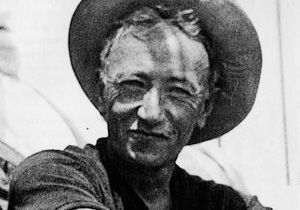
A Useless Man
Selected Stories
Sait Faik Abasiyanik
Marueen Freely
Alexander Dawe
Translators
(Archipelago Books)

Sait Faik died in 1954 on his beloved island of Burgazada, one of Turkey's Prince's Islands. He died young, only forty-eight years old. According to the translators, it was raki that got him, or rather, got his liver.He was a solitary figure. "Life for him," write Freely and Dawe, "was idling with the local fishermen and tradesmen on the island, exploring its quiet corners with his dogs,"
and, every now and then, jumping on the ferry to booze until the sun came up with the other writers in the bars of Beyoglu. Few islanders ever knew he was an accomplished writer until the day he died.
Me neither. I didn't know he was a writer, until I got half way through A Useless Man. I don't know why. I was expecting tricks, the kind of tricks we find in the stories of The New Yorker or in the pages of The Parisian Review. It just never occurred to me that we would have someone writing with the simplicity (and the art) of a Sherwood Anderson or, better, a Walt Whitman . . . in prose.
But it did get to me, and it will to you too, the kind of artful artlessness that we find so rarely now, a simplicity that hides a kind and gentle profoundness. On a launch "pointed toward Sivriada and all the stars in my breast. I am at the rudder."
The motor is churning the sea. Churning and churning. The dogs are barking in welcome; the trees draw in the stars, then the hills, as the baying dogs usher in the morning. I drink in the smell of fish, the smell of fried mussels from a Greek house on the shore; my moustache still holds the smell of anisette.
"You are my soul," I say.
The translators chose to order these thirty-seven stories according the date of publication. Which means that the earlier ones, although they may be compelling in the original Turkish, don't begin to move us, to tease and compel us like the last fifteen or twenty in the collection. If I were picking this up for the first time, I would want to begin with "His Uncle's Coat," with this (being a scary echo of his all-too early demise), "I can't kiss that beautiful boy when I want to! I can't swim in the sea when I want to; my lungs are weak and the doctor has forbidden it. I can't drink with whom I want to; it's come to the point where I am afraid, it strangles my mind, my liver forbids it."
Or this, from the third to last story, "Kalinikta,"
I breathe in the smell of stars fallen into my cup; they smell of rich coffee. The arbutus flowers have crumbled. I crush French lavender in the palm of my hand. Bees land on my tongue and sting my eyes. The sun is setting and a cormorant sinks into thought, a seagull alights on a pylon in the void. The pebbles on the shore wear the water's cloak and soldiers come out wearing all the colors of the sky . . .
§ § § If there is a theme in Sait Faik's writings, it is of our aloneness. But it is a theme played in the background, a breeze on his beloved dark sea. Aloneness, futility, our ending (perhaps as he did) abed, grieving for the path that came, took him along with it, the tide of our lives, that leaves us in a solitary place, the body failing. The last story, entitled "Loneliness," carries isolation woven into the bleak everydayness of it all, a mere hint of what is just around the corner: "Rocks are all around me. I spy a fledgling seagull --- the young ones have dark feathers and dark beaks. He trundles past with purpose in his stride. He knows what's for dinner, but still he's as mournful as a civil servant coming home from work. A fly is swirling around me. What are flies doing on this part of the island? Can't they find the way to that dirty butcher in the little village down the road from here? Only today he jacked up his price of his meat to one hundred and seventy-five kurus . . . "
The fatality of it all, but Sait Faik being the writer he is, he tells us about getting involved not with that, but with of the intrusion of the wrong word: "the word 'tract' for 'open space.'" On that miserable word he has composed a miserable poem,
The tract, ah the tract
I will look into the tract
The colored cataract in your eyes . . .My god, this character is dying from a lifelong overdose of raki, and what does he do: he writes us a loser, an absolute howler of a bad poem. Bad rhymes about "tracts" and "cataracts."
--- Pamela Wylie